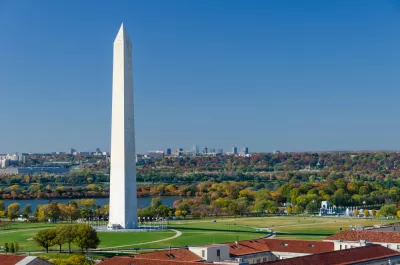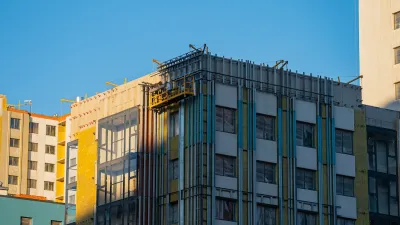In 2011, Washington, D.C. adopted the Sustainable D.C. plan, establishing the capital as a leader in green building and sustainability planning. In 2017, the city is the first in the world to achieve a new mark of distinction for its accomplishments.

Mikaela Lefrak reports: "Washington, D.C. was named the first city in the world to receive a newly-established accreditation for environmental sustainability on Thursday."
"The LEED for Cities Platinum certification recognizes the District as a leader in reducing greenhouse gas emissions, innovating around clean energy and other environmental metrics," adds Lefrak.
Lefrak notes that Washington, D.C. has more LEED-certified projects per capita than any state in the union.
According to a press release from the U.S. Green Building Council announcing the District's recognition, "LEED for Cities was launched last year and enables cities to measure and communicate performance, focusing on outcomes from ongoing sustainability efforts across an array of metrics, including energy, water, waste, transportation, and human experience (which includes education, prosperity, equity and health & safety)."
FULL STORY: D.C. Named World’s First LEED Platinum City

Maui's Vacation Rental Debate Turns Ugly
Verbal attacks, misinformation campaigns and fistfights plague a high-stakes debate to convert thousands of vacation rentals into long-term housing.

Planetizen Federal Action Tracker
A weekly monitor of how Trump’s orders and actions are impacting planners and planning in America.

Chicago’s Ghost Rails
Just beneath the surface of the modern city lie the remnants of its expansive early 20th-century streetcar system.

Bend, Oregon Zoning Reforms Prioritize Small-Scale Housing
The city altered its zoning code to allow multi-family housing and eliminated parking mandates citywide.

Amtrak Cutting Jobs, Funding to High-Speed Rail
The agency plans to cut 10 percent of its workforce and has confirmed it will not fund new high-speed rail projects.

LA Denies Basic Services to Unhoused Residents
The city has repeatedly failed to respond to requests for trash pickup at encampment sites, and eliminated a program that provided mobile showers and toilets.
Urban Design for Planners 1: Software Tools
This six-course series explores essential urban design concepts using open source software and equips planners with the tools they need to participate fully in the urban design process.
Planning for Universal Design
Learn the tools for implementing Universal Design in planning regulations.
planning NEXT
Appalachian Highlands Housing Partners
Mpact (founded as Rail~Volution)
City of Camden Redevelopment Agency
City of Astoria
City of Portland
City of Laramie





























